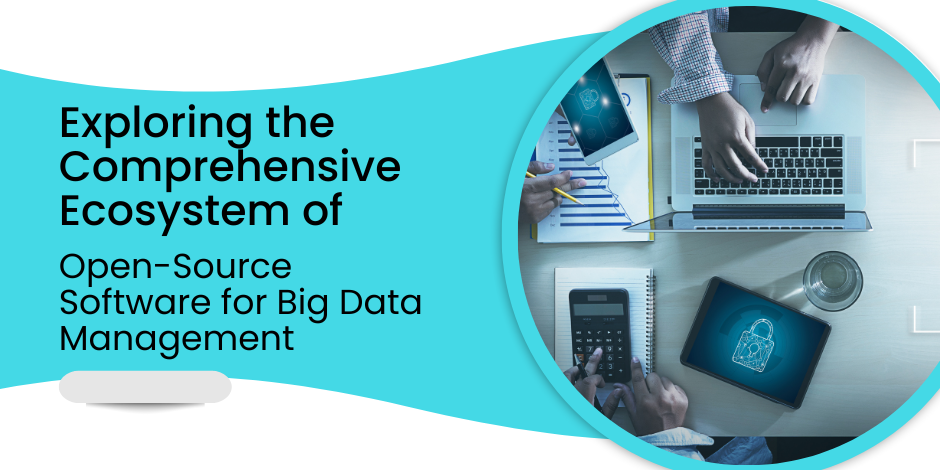Exploring the Comprehensive Ecosystem of Open-Source Software for Big Data Management

Stay Informed With Our Weekly Newsletter
Receive crucial updates on the ever-evolving landscape of technology and innovation.
Open-source software plays a pivotal role in the management of big data, providing flexible and scalable solutions for businesses of all sizes. We will delve into the diverse ecosystem of open-source software for big data management and examine its importance.
Understanding open-source software

Before delving into the world of open-source software, it is important to define what it entails. Open-source software refers to software whose source code is freely available, allowing users to access, modify, and distribute it without any licensing restrictions.
This collaborative nature promotes innovation, transparency, and community-driven development.
Defining open-source software
Open-source software is characterised by its four essential freedoms: the freedom to use the software for any purpose, the freedom to study and modify the source code, the freedom to distribute copies, and the freedom to distribute modified versions. These freedoms grant users an unprecedented level of control and flexibility.
When it comes to open-source software, the possibilities are endless. Developers can leverage existing code to build upon, saving time and effort. This collaborative approach encourages a diverse range of perspectives and expertise, resulting in software that is often more robust and reliable.
The open nature of the source code allows for continuous improvement and bug fixes, ensuring that the software remains up-to-date and secure.
One of the key advantages of open-source software is its ability to foster innovation. By making the source code accessible to anyone, it encourages experimentation and creativity.
Developers can freely explore new ideas, pushing the boundaries of what is possible. This culture of innovation has led to the creation of groundbreaking software solutions that have revolutionised various industries.
The importance of open-source software in big data management
Open-source software has emerged as a critical component in the world of big data management. Its cost-effective nature allows organisations to sidestep exorbitant licensing fees associated with proprietary software.
By utilising open-source tools and frameworks, businesses can significantly reduce their expenses while still harnessing the power of big data.
Open-source software fosters collaboration and knowledge sharing, enabling businesses to tap into a vast pool of expertise. Developers from around the world contribute to open-source projects, sharing their insights and best practices.
This collective effort results in software that is constantly evolving and improving, ensuring that organisations have access to the latest advancements in big data management.
Open-source software also provides organisations with the flexibility to customise and tailor their big data solutions to their specific needs. With the ability to access and modify the source code, businesses can adapt the software to fit their unique requirements, ensuring optimal performance and efficiency.
Emerging trends in open-source software for big data

The world of open-source software for big data management is constantly evolving. One notable trend is the rise of containerisation technologies, such as Docker and Kubernetes.
These technologies simplify the deployment and management of big data applications, enabling seamless scalability and portability.
The proliferation of machine learning and artificial intelligence has led to the development of open-source libraries and frameworks, such as TensorFlow and PyTorch, which empower organisations to leverage the power of big data for advanced analytics and predictive modelling.
The role of open-source software in big data management
The utilisation of open-source software in big data management confers numerous benefits while also presenting certain challenges. It is essential to understand the advantages and potential obstacles associated with implementing open-source solutions.
Benefits of using open-source software for big data management
When it comes to big data management, open-source software offers unparalleled benefits. Firstly, it provides organisations with the freedom to customise and tailor software to their specific requirements.
This level of adaptability allows businesses to optimise their big data infrastructure and achieve high-performance levels.
The collaborative nature of open-source software means that bugs and security vulnerabilities are rapidly identified and addressed by a passionate community of developers.
Cost reduction is also a significant advantage of adopting open-source software. By eliminating licensing fees, organisations can allocate resources to other areas of their big data initiatives.
This financial flexibility holds particular appeal for startups and small businesses.
Challenges in implementing open-source software for big data management
While open-source software presents numerous advantages, it is not without its challenges. One recurring concern is the lack of comprehensive technical support compared to proprietary software.
Organisations that opt for open-source solutions must have the necessary in-house expertise or engage with third-party providers to ensure smooth implementation and ongoing maintenance.
The sheer number of open-source tools available can be overwhelming. Selecting the right software for a specific use case requires careful evaluation of criteria such as compatibility, scalability, and community support.
Evaluating different open-source software for big data management

Choosing the most appropriate open-source software for big data management involves a meticulous evaluation process. Several criteria should be considered to ensure the selection aligns with the organisation’s requirements.
Criteria for selecting open-source software
The first criterion to assess is compatibility with the existing technological infrastructure. Open-source software should seamlessly integrate with the organisation’s current hardware and software stack to avoid unnecessary disruptions.
Scalability is another vital factor to consider. The chosen software should provide the necessary scalability to accommodate the organisation’s projected growth in data volume and processing requirements.
Community support plays a crucial role in open-source software, as it is indicative of ongoing development and timely bug fixes. Organisations should choose software that possesses an active and engaged community of contributors.
Comparative analysis of popular open-source software
Let us delve into a comparative analysis of some popular open-source software for big data management:
- Apache Hadoop: Provides a comprehensive ecosystem for distributed storage and processing of big data.
- Apache Spark: Enables lightning-fast data processing through in-memory computing.
- Apache Cassandra: A highly scalable and fault-tolerant database designed for managing large datasets.
- MongoDB: A document-oriented database that offers high flexibility and scalability for big data applications.
Future perspectives on open-source software for big data management
The future of open-source software in the context of big data management holds immense potential. As technology continually advances, several developments are expected to shape the landscape.
Predicted developments in open-source software
The advent of edge computing is anticipated to have a profound impact on big data management. By bringing computation closer to data sources, edge computing minimises latency and enhances real-time analytics capabilities.
Open-source software will undoubtedly play a significant role in supporting the infrastructure required for edge computing.
The growing importance of data privacy and security is likely to spur the development of open-source solutions that prioritise these aspects. As regulations surrounding data protection become more stringent, businesses will rely on open-source software to ensure compliance while managing and securing their big data assets.
Preparing for the future of open-source software in big data management
Organisations that wish to leverage the comprehensive ecosystem of open-source software for big data management should take several steps to prepare for the future. Firstly, investing in continuous learning and skill development is crucial to stay abreast of rapidly evolving technologies and frameworks.
By nurturing a culture of knowledge sharing, businesses can foster innovation and build internal expertise in managing and optimising open-source software.
Organisations should actively participate in the open-source community by contributing code, reporting bugs, and providing feedback. Collaborating with fellow developers and enthusiasts fuels the growth and improvement of open-source software, ensuring its robustness in the face of emerging challenges.
Conclusion
As the demand for effective big data management solutions increases, open-source software stands as an invaluable resource for businesses. By embracing the comprehensive ecosystem of open-source tools and frameworks, organisations can leverage the flexibility and scalability desired in today’s data-driven world.
If you’re interested in pursuing a career in data science, you may want to explore Institute of Data’s 3-month full-time or 6-month part-time Bootcamps.
To find out more about our programmes led by industry professionals, you can download a Data Science & AI Course Outline.

